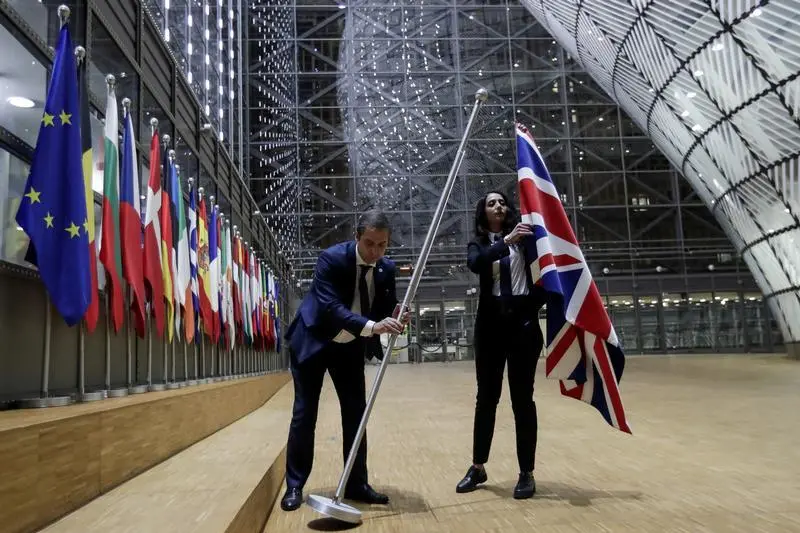PHOTO
LONDON – A history teacher at my school believed that every great event in the past should be approached on the basis of a tripartite analysis of its causes, pretexts, and results. He would list these in columns on the blackboard, and we would then have to learn them by heart: the causes of the eighteenth-century War of the Spanish Succession, the pretexts for the French Revolution, the results of the American War of Independence, and so on.
Of course, life and further study teach us that things are not that simple. Causes can be a combination of accident, ambition, and coincidence, together with more profound economic, social, and technological changes. Results can be equally difficult to gauge neatly. After all, history rarely brings closure, and it is hard to know when the effects of a great event begin and end.
In that regard, the United Kingdom’s departure from the European Union at 23:00 GMT on January 31 is probably the most important national political event in my lifetime. Enthusiastic Brexiteers are furious that Big Ben, the Westminster Parliament’s iconic clock, cannot sound to mark this event because of long-overdue repairs. They act as though this were yet another grievance to add to the long list that has sustained their campaign.
But what are we supposed to be celebrating? No one seems to know what comes next. The future is shrouded in waffle, wishful thinking, and the sort of mendacity that these days appears to exact no political price.
For starters, Brexiteers airily dismiss the question of costs. Bloomberg Economics recently estimated that Brexit has already cost the UK economy £130 billion ($169 billion) since the 2016 referendum, with the country set to be a further £70 billion poorer by the time its transition period ends on December 31. Other credible sources have produced similar figures.
But why believe anything that contradicts the quasi-religious fervor of Brexit Britain? Brexiteers regard any unwelcome economic estimate as an attempt to talk the country down. In any case, they insist, whatever the cost, we have got our freedom back. We have taken back control.
But what precisely does that mean?
According to Britain’s Chancellor of the Exchequer, Sajid Javid, the UK will avoid aligning itself with EU regulations when it leaves the bloc. Instead of being a rule-taker in the single market or customs union, it will be a rule-maker. But back in 2016, when he was business minister, Javid sang a different tune, arguing that Britain would face “a decade of stagnation and doubt” if it left the EU. So, after Brexit, perhaps we will be taking control of a new narrative that denies what we have previously thought and argued.
We are also apparently going to be able to promise one thing in Brussels and another in Belfast. Prime Minister Boris Johnson’s divorce settlement with the EU embraced a deal explicitly rejected by him in the past and ruled out by his predecessor, Theresa May, because it appears to split the UK down the middle of the Irish Sea. Until the UK has agreed a future trade deal with the EU, Northern Ireland will in effect remain in the bloc’s customs union and will have to apply checks on goods moving between its own ports and the rest of the UK.
EU officials say there can be no backsliding, but Johnson backslides all the same. Northern Ireland can, he tells people there, be both in and outside the customs union. The early Christian church used to argue about something called consubstantiality when debating the nature of a three-in-one God. Perhaps this is what Brexiteers have in mind. Northern Ireland will be both in and out at the same time: a true miracle.
And will the trade deal that the UK negotiates with its largest market be a close or distant set of arrangements? Only two things are clear. First, we won’t be able to agree anything broad, detailed, and sophisticated by the end of 2020, when Johnson wants the deal completed. Second, greater access will come at the cost of closer alignment with EU rules. There is no getting around that fact.
It remains to be seen whether any of this will matter, and whether the Conservative Party, which now owns Brexit lock, stock, and barrel, will eventually pay a political price. Or perhaps such concerns will even be forgotten as we confront two far bigger threats in the century ahead.
The first of these is climate change, and the associated struggle to get world leaders to join together in taking it seriously. US President Donald Trump says that talk of global warming is just doom-mongering, and most of his fellow Republicans appear to agree. Moreover, leaders in Brazil, Australia, and other countries shelter behind Trump’s science-defying prejudices, even as temperatures and sea levels rise and fires rage. Whatever the effects of Brexit may be, some of the consequences of climate change are already apparent.
Second, Britain will be celebrating its glorious independence from the complications of international cooperation at a time when the intellectual, political, and economic hostility between China’s communist leadership and liberal democracies is becoming ever clearer. If liberal democracy is to survive, it must stand up for itself. And we should be under no illusion: open societies under the rule of law, from the Americas to Europe, Africa, and Asia, are in China’s hostile sights. The West should not aim to encircle or pen in China. But liberal democracies cannot allow it to distort international norms in its own favor.
Compared to these huge challenges, the consequences of Brexit may seem far less significant. But the UK has chosen an odd and dangerous time to decide to go it alone.
Chris Patten, the last British governor of Hong Kong and a former EU commissioner for external affairs, is Chancellor of the University of Oxford.
© Project Syndicate 2020




















